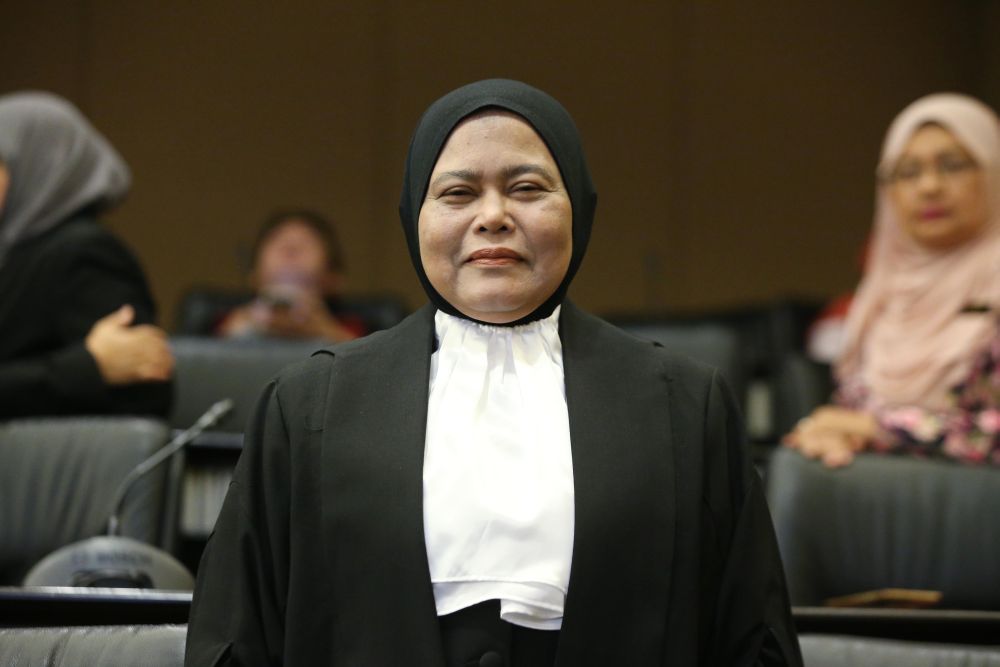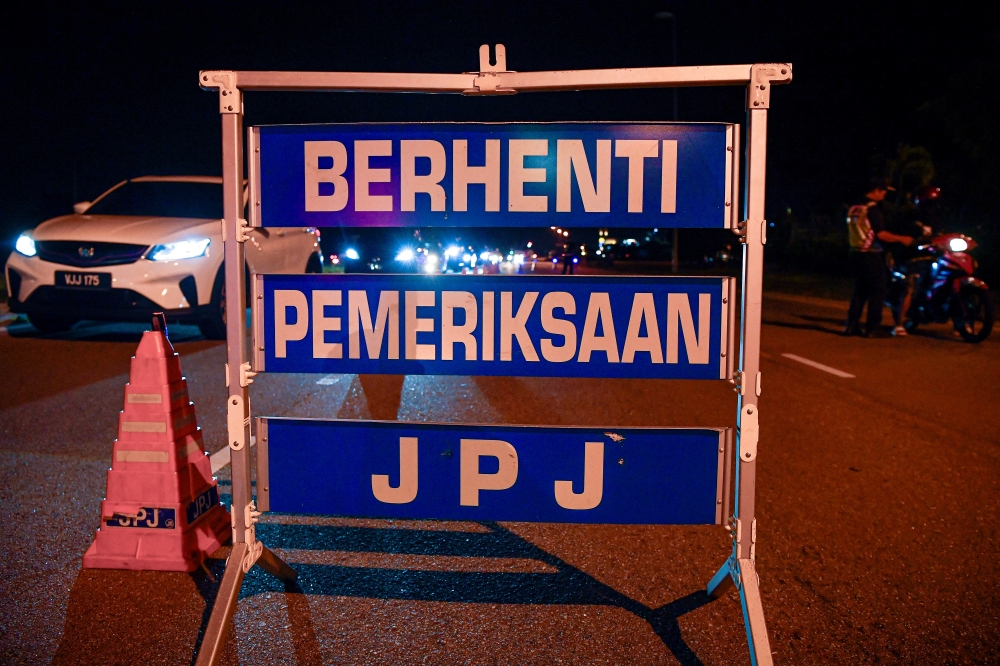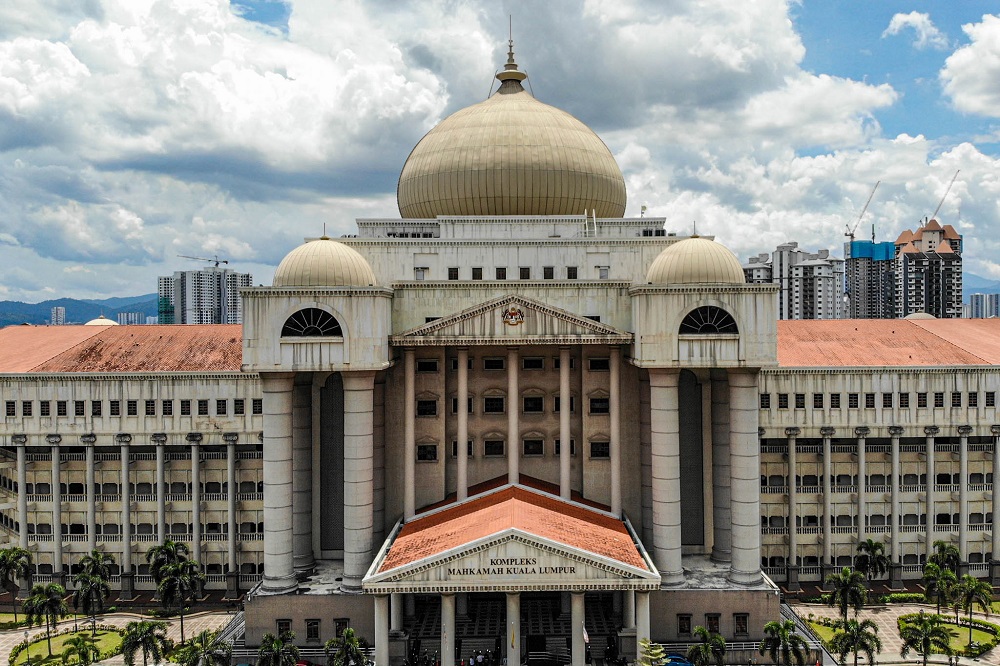KUALA LUMPUR, March 24 — The High Court recently quashed the Home Ministry’s 1986 total ban of the word “Allah” in all Christian publications in Malaysia, but how and why did the court arrive at such a decision?
Malay Mail went through the full grounds of the March 10 judgment — numbering 96 pages in total, and made available on March 17— to try and answer those questions.
But first, the facts of the case to help you understand the judgment:
The facts
Jill Ireland Lawrence Bill, a Sarawakian of the Melanau tribe, went through Malaysia’s national education system where she was taught in Bahasa Malaysia.
Jill Ireland and her family use Bahasa Malaysia to practise their Christian faith — including in their prayers — while also using the Alkitab (or the Bible) in Bahasa Indonesia as well as written and audio-visual materials in Bahasa Indonesia.
While some Muslims in Malaysia believe the word “Allah” to be exclusive to Islam, the Arabic word had long been adopted into Bahasa Malaysia and Bahasa Indonesia to refer to God, and is also part of terms in the indigenous languages of natives in Sabah and Sarawak that refer to God. Such use can be traced back to hundreds of years ago, well before the Home Ministry’s written directive in 1986 to ban such usage.
On May 11, 2008, Jill Ireland had eight educational compact discs (CDs) — each containing the word “Allah” in their titles — for her personal religious use when she landed in Malaysia upon her return from Indonesia, but all eight were seized by the Customs Department which then referred the case to the Home Ministry.
In a July 7, 2008 letter to Jill Ireland by an officer from the Home Ministry’s publications and Quranic text control division, the ministry said it had in exercising its powers under Section 9(1) of the Printing Presses and Publications Act 1984 made the decision to confiscate the eight CDs, on the three grounds of Istilah Larangan, Ketenteraman Awam and Melanggar Garis Panduan Jakim (prohibited term, public order and breach of the Department of Islamic Development Malaysia’s (Jakim) guidelines).
Jill Ireland in August 2008 filed a challenge in court through a judicial review application — which is where the courts are typically asked to review a public authority’s decision or actions — and subsequently received the eight CDs in September 2015 from the Home Ministry as ordered by the High Court and Court of Appeal.
The Court of Appeal in June 2015 also sent the case back to the High Court for a hearing on two constitutional issues as requested by Jill Ireland, which then led to the High Court’s hearing in 2017 before judge Datuk Nor Bee Ariffin and the decision delivered on March 10, 2021.
The judge was all ready to deliver the decision in March 2018, but this was deferred until this month due to attempts by those in the court case to reach an out-of-court settlement.
Since a settlement was not reached, the judge — who by now had become a Court of Appeal judge — sat as a High Court judge when delivering her decision.

It’s all about the law, not religion
One of the most important points to note about the High Court decision is that the judge did not go into issues of theology or any religious debate.
Instead, the High Court ruling in Jill Ireland’s case was strictly on legal and constitutional issues, based only on other existing court judgments and the views of a law expert on the Federal Constitution, as well as all available evidence presented in court including historical documents.
Citing decisions from the higher courts that effectively meant the High Court need not delve into theological matters in this case, Datuk Nor Bee pointed out that the facts in Jill Ireland’s case showed that the home minister’s 1986 decision — which was being challenged — was based on public order considerations and not theological considerations.
Here’s everything you need to know about the most essential parts of the 96-page full grounds of the High Court judgment, as summarised by Malay Mail:
What happened before the 2008 seizure of the Sarawakian’s CDs
In early 1982, the Malaysian government gazetted the Internal Security (Prohibition of Documents) (No. 3) Order 1982 or PU (A) 15/1982, which imposed an absolute prohibition on the printing, publication, sale, issue, circulation or possession of the Alkitab throughout Malaysia.
This absolute ban was, however, later repealed by a March 22, 1982 gazetted government order made by then deputy home minister Tan Sri Abdul Rahim Tamby Chik, known as the Internal Security (Prohibition of Publication) (No. 4) Order 1982 or PU (A) 134/1982.
But unlike the first 1982 government order that placed a total ban on Alkitab, the March 1982 order stated that the prohibition of the “printing, publication, sale, issue, circulation or possession” of the Alkitab in Bahasa Indonesia — which the government deemed as prejudicial to national interest and national security — will not apply to the possession or use of the Alkitab in churches by Christians throughout Malaysia.
In comparing the two gazetted government orders, Datuk Nor Bee noted that the repealed initial 1982 order essentially meant that the use of the word “Allah” was “absolutely prohibited”, and that the March 1982 order lifted the absolute prohibition on Alkitab in Malaysia and maintained the Alkitab ban with an exemption, which she said essentially meant that the Alkitab which carries the word “Allah” can be used but within the confines of churches only.
Forward to 1986
On May 19, 1986, then prime minister Tun Dr Mahathir Mohamad wrote a letter to the Home Ministry’s secretary-general stating that the Cabinet had tasked the deputy prime minister with drawing up a list of words in the national language that can and cannot be used by those in the Christian faith.
In a memorandum, dated May 16, 1986 and addressed to the prime minister, then deputy prime minister Tun Ghafar Baba listed 12 words that could be used in the Alkitab, and four words — including “Allah” — that could not be used in the Alkitab. Also included was the condition that the front cover of such publications carry the words “Untuk Agama Kristian.”
The High Court in Jill Ireland’s case said that the prime minister’s letter endorsed the decision by the deputy prime minister and that it was reasonable to infer that the deputy prime minister’s note became the “Cabinet’s policy decision” on words that can and cannot be used by Christians.
Later, on December 5, 1986, an officer of the Home Ministry’s publications control division signed off on behalf of the ministry’s secretary-general on a circular, listing the same 12 words that could be used in Christian publications in Bahasa Malaysia but with the condition of “Untuk Agama Kristian”, while also listing the same four words — including “Allah” — which the ministry said could not be used in Christian publications in Malaysia.
In the written directive via the December 1986 circular, the Home Ministry’s officer said that the government’s decision on the use and conditions for these terms in Christian publications was purely to ensure “public order and avoid misunderstanding between Muslims and Christians”, with the directive addressing alleged “confusion” within society about the usage of such terms.
Instead of mirroring the Cabinet’s policy decision in May 1986, the Home Ministry’s December 1986 directive had “marked discrepancies” with the Cabinet decision that it was supposed to be executing.
Comparing the two sets of documents, Datuk Nor Bee said the Cabinet’s May 1986 policy decision did not impose a “total ban” on the four words including “Allah”, while the December 1986 directive imposed a complete ban on the four words.
The judge, however, said the Cabinet could not have intended in May 1986 to impose a total ban on the four words as the documents by the prime minister and his deputy were about the Alkitab, and as the March 1982 gazetted government order (PU (A) 134/1982) — which prohibited the Alkitab unless used in churches in Malaysia by Christians — was still in force.
“If the Cabinet’s policy decision was to impose a total prohibition on the four words, it is reasonable to expect that PU (A) 134/1982 would be repealed or modified or varied to reflect the new policy. This is because the effect of a total prohibition would extend to possession or use in the churches. That was not done,” the judge said.
The judge said the Home Ministry’s publications control division had disregarded the clear words in the deputy prime minister’s note about the four words, and replaced it instead with a total ban for “reasons best known only” to the division and which remains unexplained.
Since there was no evidence that there were changes to the Cabinet’s policy decision or that the Cabinet had endorsed the changes as seen in the 1986 December directive, the judge said the directive is “inconsistent” with the Cabinet’s policy decision.

Why do the 1986 events matter to the 2008 CDs seizure?
After Jill Ireland filed her lawsuit to challenge the CDs’ seizure and to seek for her constitutional rights to be upheld, the Home Ministry officer — who had issued the July 2008 letter to inform her why the CDs were being withheld — had in 2009 filed an affidavit in the court case to say that the seizure was legal and in line with the December 1986 government directive.
Tan Sri Syed Hamid Albar — who was the home minister during the seizure — in a 2010 affidavit in the lawsuit also referred to the 1986 documents to justify the seizure, producing in court the prime minister’s letter, deputy prime minister’s note and the ministry’s directive.
In other words, the government’s position in Jill Ireland’s case is that the December 1986 directive is a Cabinet decision related to the government’s policy then to avoid any confusion among the Muslims and Christians which is allegedly likely to be prejudicial to public order. Jill Ireland then challenged the 1986 directive as part of her lawsuit.
Datuk Nor Bee decided that the Home Ministry’s December 1986 directive is illegal and unlawful, and that it is invalid due to the home minister’s lack of statutory powers under the law to make such a directive.
Looking at the Printing Presses and Publications Act (PPPA), the judge said that this law is not a “general law on public order”, but that is instead a “specific law” to regulate licensing of printing presses, issuing of permits to publish newspapers and control undesirable publications.
The judge said the home minister had acted illegally and beyond the limits of his powers under the law, and that it was wrong for the government to have allowed the enforcement of the 1986 directive under Section 9(1) of the PPPA.
Datuk Nor Bee said the decision to make the 1986 directive was also “irrational and perverse”, as there was total disregard that it would be in direct conflict with the still valid 1982 gazetted government order. (The 1986 directive would effectively be a ban on the Alkitab due to the use of the word “Allah”, while the 1982 order only bans the Alkitab outside of churches).
Applying the legal test of Wednesbury principle of reasonableness commonly used in judicial review cases, the judge held that the home minister’s 1986 decision was “so outrageous in its defiance of logic that no sensible person could have arrived at the decision he had made.”
No proof of public order under threat or ‘confusion’
Having already held that the December 1986 directive is illegal and irrational, the judge went on to examine the two other reasons cited by the home minister to justify the 1986 directive, namely public order and confusion.
Datuk Nor Bee said, however, that the government did not show any “adequate, reliable and authoritative” evidence to justify the December 1986 directive, noting that there was no evidence given of any disruption or any potential to disrupt the public order before or at the time the directive was made or even when the Cabinet made its May 1986 policy decision.
Noting that the government did not cite any specific cases of public disorder, the judge said the only reason given by Syed Hamid was that the impact of the High Court’s December 2009 decision (in a case involving the banning of “Allah” in the local Catholic church’s internal newsletter Herald) had purportedly led to a threat to public order.
The judge said the home minister’s citing of an event that happened more than 20 years after the 1986 directive was an attempt to create an evidential basis for the directive when none exists, while agreeing with Jill Ireland’s lawyers that decisions are to be made based on facts available to the decision-maker at the time of the decision.
The judge cited the undisputed evidence presented in Jill Ireland’s case that the generations-long use of the word “Allah” in Bahasa Malaysia by Sabah’s and Sarawak’s Christian community since the year 1629 in the practice of their religion, had not caused problems leading to public disorder throughout all these years.
The judge said the Cabinet’s 10-point solution in 2011 also shows that there was no threat to public order, and that the long-standing “Allah” controversy could have been put to an end if the 2011 solution was given full effect and if the conflicting 1986 directive had been withdrawn then.
The judge also said that there was no evidence from the government of any confusion or misunderstanding having arisen from the Christians’ use of the word “Allah”, and that the government did not show how and when such alleged confusion had disrupted public order.
Constitutional rights upheld
Having decided that the 1986 directive could not be justified on the grounds of public order or confusion or misunderstanding, the judge went on to examine whether Jill Ireland is entitled to declarations to affirm her constitutional rights to freedom of religion and equal treatment under the law.
The judge noted the extensive research by Jill Ireland’s lawyers on the legislative history of the 1957 Merdeka Constitution and the 1963 Malaysian Constitution, including historical documents from 1957 and 1962 which showed the guarantee of freedom of religion to Sabah and Sarawak before they agreed to form Malaysia together with Malaya (now Peninsular Malaysia).
Noting a Court of Appeal ruling that said the guarantee of religious freedom cannot be curtailed by laws even during Emergency, the judge also noted that religious freedom is also absolutely protected even in times of threats to public order as the Federal Constitution’s Article 149 and Article 150 cannot be used to restrict such a right.
Disagreeing that the PPPA —— which was used to enforce the 1986 directive —- is a general law on public order that can be used to restrict religious freedom, the judge went on to say that the 1986 directive had breached the Article 11(1) guarantee of religious freedom.
The judge had pointed out that the right to profess and practise one’s faith should include the right to have access to religious materials, noting it was not disputed that the eight CDs seized were for Jill Ireland’s personal religious edification.
As for the constitutional right to equality before the law and non-discrimination sought by Jill Ireland, the judge said it was clear that the Sarawakian had been discriminated.
The judge also disagreed that the court declaration sought by Jill Ireland is hypothetical or premature, saying that Jill Ireland had already been deprived before of her rights and that there is no assurance that it may not happen again.
“The declaratory order will eliminate anxiety of the applicant having to live under a cloud of fear and uncertainty,” the judge said, before proceeding to grant the two declarations sought by Jill Ireland.
The two declarations are that it is Jill Ireland’s constitutional right under the Federal Constitution’s Article 3, 8, 11 and 12 to import the publications (in the form of the eight CDs) in exercise of her rights to practise religion and right to education, and a declaration under Article 8 that Jill Ireland is guaranteed equality of all persons before the law and is protected from discrimination against citizens, on the grounds of religion in the administration of the law ? specifically the Printing Presses and Publications Act 1984 and Customs Act 1967.
This is on top of the declaration that the government directive issued by the Home Ministry’s publications control division via the December 5, 1986 circular is unlawful and unconstitutional.
This High Court decision is currently under appeal to the Court of Appeal by the federal government and home minister.
_10032021.jpg)



















